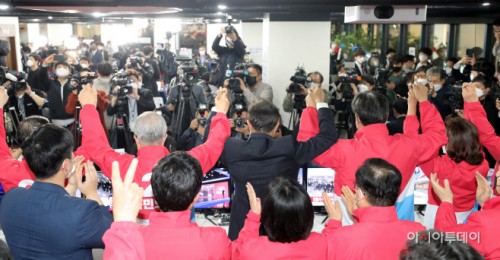 |
| Oh Se-hoon of the main opposition People Power Party shakes hands with his party members at his party’s office in Yeouido, Seoul, after news that he has outpaced his rival Park Young-sun in vote-counting for the Seoul mayoral election that took place on April 7, 2021./ Photographed by Lee Byung-hwa |
AsiaToday reporter Jo Jae-hak
The April 7 by-elections was clearly a bitter judgement of the public against the Moon Jae-in administration. Oh Se-hoon of the main opposition People Power Party (PPP) is expected to win the Seoul mayoral seat against his rival Park Young-sun of the ruling Democratic Party (DP) by double-digit margin, an exit poll showed. In the southern port city of Busan, PPP candidate Park Heong-joon beat DP candidate Kim Young-choon by double-digit margin to win the Busan mayoral seat.
With less than a year left for the March 9 presidential election next year, the government and the ruling party are expected to inevitably revise the overall state administration and major policies with the public’s anger toward them. On the other hand, the main opposition PPP, who has lost four national elections since 2016, has laid a foothold for political revival due to its landslide victory in Seoul and Busan.
Oh Se-hoon defeated his rival Park Young-sun 59% to 37.7% in the exit poll, jointly released by three broadcasters: KBS, MBC and SBS at 8:15 pm on Wednesday. Busan mayoral candidate Park Heong-joon also defeated DP candidate Kim Young-choon 64% to 33% in the exit poll. The total turnout for this by-election was 56.6% with 57.9% in Seoul and 52.7% in Busan, the highest rates in South Korean by-election history.
The ruling party’s humiliating defeat seemingly comes from its failure to meet public expectation to overcome the COVID-19 pandemic, carry out various reforms in the society, and recover people’s livelihood economy after its landslide victory in the April general election last year. Besides, soaring real estate prices and a sharp increase in real estate taxes as well as land speculation scandal by state-run organization officials and high-ranking government officials sparked public anger. In addition, the by-elections were unfavorable to the ruling party because the former mayors in Seoul and Busan, both from Moon’s Democratic Party, faced allegations of sexual harassment.
On the other hand, the opposition bloc fielded a single candidate, raising the chances of election victory. Besides, Oh has successfully attracted voters in their 60s, those in their 20s and 30s, and even swing voters by winning a primary with former PPP floor leader Na Kyung-won and even People’s Party leader Ahn Cheol-soo and becoming a single candidate of the opposition bloc. The widespread support in the three affluent Gangnam regions and Gangdong, where public sentiment over the real estate issue, was severe, also laid the foundation for Oh’s overwhelming victory.
Welcoming the exit poll results, PPP interim chief Kim Chong-in said they reflect the public’s anger toward the Moon administration. “I think the elections mark a victory of the people’s common sense. This may be the expression of the people’s anger toward the government today,” Kim said. “I realize that public sentiment is fearful. Above all, the people clearly expressed their position on the situation of this administration through the elections,” Park Heong-joon said.
#Opposition #People Power Party #Oh Se-hoon #Park Heong-joon #by-elections
Copyright by Asiatoday
Most Read
-
1
-
2
-
3
-
4
-
5
-
6
-
7





















